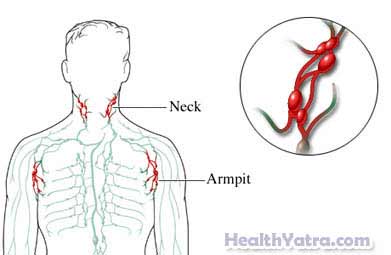Definition
Chronic lymphadenitis is inflammation or infection of a lymph node for an extended time. Lymph nodes are part of the immune system. This system fights and prevents infections. The lymph node’s job is to filter out unwanted substances, such as bacteria and viruses, and help eliminate them from the body.
Lymph nodes occur in clusters in the neck, arm pits, and groin. Chronic lymphadenitis may affect one node, several nodes in one area, or nodes in many areas of the body.
The sooner chronic lymphadenitis is treated, the more favorable the outcome, depending on the cause. If you suspect you have this condition, contact your doctor right away.

Causes
Lymph nodes normally swell when fighting off an infection. In cases of more serious infection, the swelling may be prolonged. Lymphadenitis is usually caused by an infection that has spread to the lymph nodes from a skin, ear, nose, or eye infection. Other causes of lymphadenitis include:
- Infection with streptococcal or staphylococcal bacteria
- Tonsillitis
- HIV infection
- Genital herpes
- Mononucleosis
- Juvenile rheumatoid arthritis
- Leukemia or lymphoma
- Sickle cell anemia
- Kawasaki disease
Risk Factors
Factors that may increase your chance of developing chronic lymphadenitis include:
- Having one of the causes of lymphadenitis
- Close contact with someone who has one of the causes of lymphadenitis
- Age: 12 or younger
- Contact with animals, specifically cats, rats, or cow
Symptoms
If you experience any of these symptoms, do not assume it is due to chronic lymphadenitis. These symptoms may be caused by other, less serious health conditions.
Symptoms include:
- Swollen, painful, tender, or hard lymph nodes/glands
- The skin over a node is red and warm to the touch
- Fever with the following symptoms:
- Chills
- Loss of appetite
- Heavy perspiration
- Rapid pulse
- General weakness
- Difficulty swallowing
- Difficulty breathing
- Neck stiffness
Diagnosis
Your doctor will ask about your symptoms and medical history. A physical exam will be done.
Your bodily fluids and tissue may be tested. This can be done with:
- Complete blood cell (CBC) count
- Blood culture
- Biopsy of the lymph node
Images may be taken of your bodily structures. This can be done with ultrasound.
Treatment
Treatment of chronic lymphadenitis depends on the cause. Talk with your doctor about the best treatment plan for you. Treatment options include the following:
Medications
- Antibiotics to control infection
- Anti-inflammatory medications to help reduce inflammation and swelling; aspirin may be recommended for adults.
- Note: Aspirin is not recommended for children or teens with a current or recent viral infection. This is because of the risk of Reye’s syndrome. Ask your doctor which other medicines are safe for your child.
- Other treatments specific to the diagnosis
Supportive Care
Hot, moist compresses on the lymph nodes can help relieve pain.
Surgery
Surgery may be necessary to drain pockets of pus if they occur.
Prevention
To help reduce your chances of getting chronic lymphadenitis, take the following steps:
- Seek prompt treatment of bacterial and viral infections. Contact your doctor at the first signs of infection.
- Take steps to prevent getting an infection:
- Practice good hygiene practices, such as washing your hands regularly.
- Avoid close contact with people who are sick.
- Eat a healthful diet that is low in saturated fat and rich in whole grains, fruits, and vegetables.
